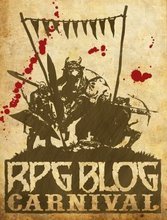Player Contributions was one of my earliest posts to this blog. I’ve learned so much about blogging since then, I’ve decided to update it.
What are player contributions?
The Amber Diceless RPG introduced me to player contributions. The idea is simple:
You get added points for your character if you agree to do something helpful for the GM every game session.
The exact details are left up to the GM and player to work out. Amber Diceless suggests things such as character journals, campaign logs, character portraits, etc. as player contributions. In that system, you get more points to build your character if you commit to a contribution for every game session.
It works great in theory
I tried using character/player contributions as written in the Amber rules, but soon met a major snag — getting players to follow through. Usually, I’d get enthusiastic contributions for 3-4 game sessions, then nothing. I tried giving giving out “luck” penalties — i.e. the player’s character would have strokes of bad luck for that game session — to those who didn’t live up to their agreement, but that seemed too punitive. Especially since most “non-contributors” weren’t being lazy– they simply found they didn’t have time to keep up with the obligation. Real Life™ would inevitably intrude.
The Fix
Finally, I came up with an idea that worked. Instead of giving extra character creation points at the outset, I would hand out a small amount of experience points each game session I received a contribution. That way, no one would have to feel guilty if their child got the flu the previous week, or if term papers were due, or such. Also, if a player who normally didn’t turn in anything got a sudden burst of inspiration, she could make a single contribution, without having to take on a long-term commitment she wouldn’t be able to keep up.
Types of player contributions
What kinds of things make good character contributions? That really varies from game to game. What would be the most helpful to you as a GM? Some types of contributions that work well in my game include:
- Written, detailed character backgrounds
- Completed character questionaires
- Character journals — the events of the campaign seen through the PCs eyes.
- Campaign notes — the events of the game objectively
- Character portraits
- Maps or “landscapes” of important regions of the campaign world
- Creating game props
- In-game newspapers or “scream sheets” (for you Cyberpunks out there 😉 )
- Keeping the inventory of party loot and making copies available to GM and all players
On the extreme end, I once had a player turn in the equivalent of a Master’s Thesis on Gehenna lore (for a classic World of Darkness game), complete with fictitious bibliography and properly-formatted footnotes. Basically, I’ll give points for anything that takes some of the GM’s workload off my shoulders
How do contributions help?
Character Backgrounds: Most of my games are very character-driven. Character backgrounds really do matter and will have an effect on the game world as a whole, so the more I know about PC, the more I can tie him into the game. To help a player develop his character’s background, I generally hand out a character questionnaire to each player at the beginning of a new campaign. Players can either fill that out or write something of their own design.
Character Portraits: Yes, I do accept written descriptions or references to book covers or movie characters as PC portraits. I don’t think this contribution should be limited to those who can draw.
Character Journals and Game Session Notes: Character journals and game session notes are definitely my favorite contributions to receive. I tend to run “off the cuff” — frequently, my game notes for a particular session are a list of NPC names and possible locations. I make up most of the details during the game session and I find that if I stop to take notes, I lose the flow of the game. So having someone else in the group writing this stuff down for me is a huge help. That way, I don’t run into a problem of Bill But-You-Said-Last-Week-His-Name-Is-Fred, the baker. As far as character journals go, each player can specify if his journal exists in-game (where another character may be able to find and read it) or out of it (just between the player and the GM).
These are just some examples. Anything you and the player can agree on as being helpful to either you or the game as a whole can make great player contributions. Of course, I’m the final arbitrator about what constitutes an helpful contribution. But in all cases, I have one overarching rule — a character can only get experience for one contribution each game session.
How much to award?
Generally, you want to make the award small enough so the PCs don’t jump power levels faster than you can keep up with them. On the other hand, you want them to be large enough to provide a real incentive.
How small is small?
In for games with low experience point values, such as Amber, World of Darkness, In Nomine, etc. where the PCs might get an average of 1-3 points per session, I hand out one experience point per contribution per game session. I require all written contributions be at least one page long. On rare occasion, I might give out two for something that the player worked really hard at (see the academic dissertation above).
For D&D and other games that use experience points in the hundreds to thousands scale, I usually award 100 – 200 experience points, depending on how useful and detailed the contribution is. That amount works great for low levels (all the D&D games I’ve run for the last 20 years have been low-level). But one of my readers, trashcondor, pointed out to me — at higher levels, it’s way too small an amount to be worth anything. Trashcondor suggested, instead, that I give out a bonus amount of 20% of each session’s experience points. I’m going to try this in my D&D games from now on.
Give player contributions a try. You may find — as I do — that they really help make GMing a game easier. If you’ve got specific examples of contributions used in any of your games, I’d love to hear about it in the comments. What did the player do and what kind of reward did you give them? Share your thoughts and ideas!

 Well, I’m bringing that back. Eventually, there’ll be a website and quote pages back up. In the meantime, I’m going to start posting a few game quotes each week. These are actual quotes from real game sessions and I’m breaking them down by game system, ’cause some of them are only funny if you know the system referenced.
Well, I’m bringing that back. Eventually, there’ll be a website and quote pages back up. In the meantime, I’m going to start posting a few game quotes each week. These are actual quotes from real game sessions and I’m breaking them down by game system, ’cause some of them are only funny if you know the system referenced.




